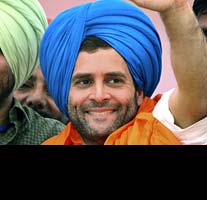
Chandigarh, October 12: Gujarat and Himachal Pradesh may be going to polls, but it's Punjab where Congress general secretary Rahul Gandhi has created a political storm. Reacting to his remark that "seven out of 10 youth in Punjab are addicted to drugs," the Punjab government hit back saying, "Rahul is a national joke" and sought an apology from him.
This sharp reaction came from Harcharan Bains, advisor to Punjab chief minister on media and national affairs, after Rahul raised the issue of drug addiction while addressing a students' rally here at the Panjab University (PU) campus on Thursday.
"Rahul Gandhi is a national joke. He invites youth of Punjab and then refers to them as drug addicts. Is he mindful of what he is speaking and to whom?" asked Bains.
Rahul, on a two-day visit to Punjab during which he met state Congress leaders at Amritsar, had said, "Youth have the power and knowledge. They could be the solution to all the ills. But what's happening to this human resource in Punjab? The problem of drug addiction is high in Punjab and the government has not shown any seriousness in solving it. Unemployment is also on a high."
Senior Congress leaders said Rahul seemed to have done his home work, basing his attack on an affidavit filed by the Punjab government with the Punjab and Haryana High Court in May 2009 that "Punjab is in the grip of drugs that weakens the morale, physique and character of the youth."
However, deputy CM Sukhbir Badal rubbished Rahul's statement citing the court observation saying, "Rahul Gandhi is trying to malign the youth of Punjab and specially the Sikh youth."
"Congress's policy was first to dub our youth terrorists. Now, they want to put the stigma of drugs on them. I am shocked at the statistics he has announced. Before making such allegations, he should look at the rape cases in a state ruled by his party," Sukhbir told TOI. He blamed the Congress of trying to divert the country's attention from the recent scams.
"Contraband is smuggled through Pakistan through international border and it travels through Punjab before being supplied at other places. Security of international border is the responsibility of government of India and we have no control over it. However, amount of drug seized and number of accused arrested by Punjab police is historic in the last few months," he added.
During his speech, Rahul also lashed out at the Shiromani Akali Dal (SAD)-BJP government in Punjab for "not keeping its promise of pension for all unemployed in the state and for not using scholarships meant for SC/ST students."
"Earlier, Punjab had announced pension for unemployed in the state. But, they forgot this promise. Now, they say this pension would be given to only those whose names are registered with the state employment exchange," he said.
"While the Centre has been sending scholarships for SC and ST students in Punjab, the state government has been returning them," he added.





Comments
Add new comment